












Retirement is an opportunity to wave goodbye to the daily grind. Retirees may focus on rest and relaxation, and many make travel a major component of their lifestyle.
According to a 2022 Gallup poll, Americans expect to retire at an average age of 66, up from 62 in 2022. However, most do not hold out that long; the average actual retirement age is 61. Canada used to have a mandatory retirement age of 65, but that mandate was overturned in 2009. Today, the average retirement age for Canadians is 64.4 for men and 63.8 for women, according to Statistics Canada.
Upon retiring, many retirees discover that they sorely miss getting out of the house and being productive through some sort of employment. Others may find it necessary to sup -
plement their retirement incomes. There are a few things to know about working during retirement, particularly if a person is collecting government benefits.

• According to the Social Security Administration, those falling under full retirement age for the entire year (which was raised to age 67 for those born in 1960 or later) will be subjected to an SSA deduction of $1 from your benefit payments for every $2 you earn above the annual limit. For 2022, that limit is $19,560. In the year you reach full retirement age, SSA deducts $1 in benefits for every $3 you earn above a different limit, but they only count earnings before the month you reach your full retirement age. For full retirement age reached in 2022 your limit on earnings for the months before full retirement age
is $51,960. After full retirement age, there is no limit on earnings.
• The Financial Consumer Agency of Canada reports that individuals between the ages of 60 and 65 who continue to work while receiving a Canadian Pension Plan (CPP) retirement benefit must still contribute to the CPP. Your CPP contributions will go toward post-retirement benefits. These benefits increase your retirement income when you stop working. However, if you continue to work while getting a CPP retirement pension and are between the ages of 65 and 70 years old, you can choose not to make any more CPP contributions.
• Keep in mind that if you are on Medicare, extra income could potentially trigger surcharges for parts B and D. It’s beneficial to speak with
a financial consultant to weigh the pros and cons of part-time work during retirement.
• Part-time work does not need to be daily work. Many retirees work according to how they feel. Some options include seasonal jobs, such as driving shuttles in national parks or working during the holidays in retail stores. Or you may use your expertise to consult or start a business.
• A number of people work parttime during retirement simply to get out of the house. Jobs that help you interact with a number of people can be beneficial, as socialization has been shown to benefit the mental health of seniors.
Working during retirement can supplement savings and provide structure that some retirees may be missing.
Fellow and State Chair of the American College of Trust and Estate Counsel (ACTEC). Selected as a 2019 Great Plains Super Lawyer. Practicing in Elder Law, Medicare and Medicaid, Miller Trusts, and Trusts and Estates.

Caldwell & Brierly, PLLC www.lawyeriniowa.com
211 1st Ave. W., Newton, IA 50208
Call 641-792-4160 for an appointment.
No one is immune to issues that can adversely affect their mental health, including men and women nearing retirement age and those who are already retired. Though the term “golden years” suggests life in retirement is one sunny day after another, many individuals 60 and older are dealing with mental health issues.

According to the World Health Organization, approximately 15 percent of the world’s adults aged 60 and over suffer from a mental disorder. What makes that statistic even more troubling is that the WHO acknowledges it likely doesn’t paint the most accurate picture of seniors and mental health, as depression is often undiagnosed among older men and women and untreated because it co-occurs with other issues affecting seniors.
In the past, the Centers for Disease Control and Prevention has acknowledged that late-life anxiety was not readily understood. However, much progress has been made in recent years thanks to a heightened awareness of the problem of seniors and mental health. That means seniors now have ample resources they can look to as they seek to learn what they can do to safeguard their mental health.
The National Institute of Mental Health notes that recognizing the signs of mental health issues is the first step to getting treatment. Mental health issues vary, and individuals with anxiety will like-
ly experience different symptoms than those with depression. But the NIMH notes that the following are some of the warning signs of mental health issues.
• Noticeable changes in mood, energy level, or appetite
• Feeling flat or having trouble feeling positive emotions
• Difficulty sleeping or sleeping too much
• Difficulty concentrating, feeling restless, or on edge
• Increased worry or feeling stressed
• Anger, irritability, or aggressiveness
• Ongoing headaches, digestive issues, or pain
• Misuse of alcohol or drugs
• Sadness or hopelessness
• Suicidal thoughts
• Engaging in high-risk activities
• Obsessive thinking or compulsive behavior
• Thoughts or behaviors that interfere with work, family, or social life
• Engaging in thinking or behavior that is concerning to others
• Seeing, hearing, and feeling things that other people do not see, hear, or feel
Seeking help
As noted, a growing awareness of mental health issues and how they affect seniors has translated to more available resources for aging men and women
who need help. Within the United States, seniors can visit the NIMH Help for Mental Illnesses webpage (https://www.nimh.nih.gov/health/find-help) to access contact information for various groups that help people in times of mental health crises. In Canada, individuals can visit the Canadian Mental Health Association at https://cmha.ca/find-help/ find-cmha-in-your-area/ for contact information for various groups across the country.
The National Institute on Aging notes that most cases of depression cannot be prevented. However, the NIA also notes that healthy lifestyle changes can have long-term benefits of seniors’ mental health. Such changes include:
• Being physically active
• Eating a healthy diet that can reduce risk for diseases that can bring on disability and depression
• Getting adequate sleep, which for seniors is between seven to nine hours per night
• Remaining socially active, including regular contact with friends and family
• Participating in activities you enjoy
• Sharing mental issues or concerns with friends, family members and your physician
Research indicates that seniors are vulnerable to mental health issues. More information about how to combat and overcome such issues is available at nimh.nih.gov.
What constitutes a perfect retirement is different for everyone. Some people may imagine spending their golden years fishing their days away, while others may aspire to finally embrace their inner globetrotter. Though individuals’ retirement dreams differ, every retiree will need money, which only underscores the importance of a wise and disciplined approach to money management.
Average life expectancies have risen considerably over the last several decades. According to estimates from the United Nations Population Division, the average life expectancy in Canada for both sexes is just under 83 years, while it’s slightly more than 79 in the United States. Those figures are a welcome sign, but they may inspire a little fear among seniors who are concerned that they might outlive their money. No one knows how long they will live, but everyone can embrace a handful of money management strategies to increase the chances that they won’t feel a financial pinch in retirement.
• Study up on the tax implications of withdrawing from your retirement accounts. Every retirement investment vehicle, whether it’s an IRA or a 401(k), has tax implications. Money withdrawn too early may incur tax penalties, and even money withdrawn long past retirement age could elevate retirees into a new tax bracket that could prove
costly. A financial advisor can help retirees determine the tax implications of withdrawing money from their retirement accounts and may even develop a detailed guideline of when withdrawals should be made and how much should be withdrawn in a given year in order to minimize tax liabilities.

• Prioritize your own needs. Though retirees, particularly those with children and grandchildren, may feel an obligation to help their families in difficult financial times, generosity can be very costly for adults who have stopped working. Retirees may or may not have opportunities to generate new income, and even those who do likely won’t make enough to meet their daily financial needs. Given that reality, retirees must prioritize their own financial needs, including their immediate needs and those they will have for the rest of their lives. Though it might be difficult to turn down loved ones’ requests for financial help, retirees must make sure they can pay their bills and maintain a quality of life that won’t jeopardize their long-term health.
• Examine your housing situation. Equity in a home is a feather in the cap of many retirees. Retirees who own their homes and live in locations with high property taxes might be able to cash in on their equity by selling their homes and downsizing to a smaller home with lower property taxes. If moving is not a consideration,
discuss a reverse mortgage with a financial advisor. A trusted financial advisor can highlight the advantages and disadvantages of reverse mortgages, which are a great option for some people to improve their financial well-being in retirement.
• Stick to a budget during retirement. The U.S. Department of Health and Human Services reports that roughly 70 percent of
individuals who turn 65 will need long-term care in their lifetimes. That’s just one expense retirees must budget for, and it’s more sizable than some people may recognize.
In fact, the Fidelity Retiree Health Care Cost Estimate found that the average retired couple age 65 in 2022 will need roughly $315,000 to cover health care expenses in retirement. And health care costs are just one of
many expenses retirees can expect to have. Budgeting and avoiding overspending can ensure retirees have the money they need when they need it.
No one wants to outlive their money in retirement. Various strategies can help retirees effectively manage their money so they can enjoy their golden years without having to worry about their finances.

Physical activity is an important component of overall health. Health experts advise that exercise can increase lean body mass, prevent conditions like diabetes and cardiovascular disease, improve balance, and positively affect mental health/ cognition. Exercise also can foster socialization with others, helping people overcome boredom and isolation.
As individuals get older, they may not be able to participate in all of the activities they enjoyed as youths, but that doesn’t mean older adults must resign themselves to sedentary lifestyles. There are plen -
ty of entertaining ways to remain physically active that can accommodate any limitations a person may have. Explore these methods for staying active.
Community senior centers often fill calendars with a vast array of activities, some of which can include physical activities. Hikes, walking tours, dances, and other activities all serve as entertaining ways to get out and about while meeting some fitness goals.
The Office of Disease Prevention and Health Promotions says adults
should get 150 minutes of moderate exercise per week. Raking leaves, mowing the lawn, digging in flower beds, trimming bushes, and other outdoor tasks could help a person meet this quota in a way that doesn’t seem like exercise at all.
Little kids may inspire older adults to be more active, as it can be difficult to keep up with those youngsters. Take infants or toddlers for walks or push them in strollers. Attach a child seat or towing carriage to a bicycle and ride around the neighborhood. Play games that require movement, such as hide-
and-seek or Marco Polo in the pool. If it’s snowing, have a snowball fight or make a snowman in the yard.
Find hobbies that incorporate physical activity. Perhaps learning to salsa dance or taking Zumba™ will be fun? Pickleball has caught on across the nation. The sport is a mix of tennis, racquetball and badminton that caters to all ages. Joining a bowling team is another way to get active and meet new people.
Physical activity is important at any age. Seniors can explore fun ways to stay in shape and be active to reap all the benefits of exercise.
roots were established as far back as the 1920s. The providers of Newton Clinic have been caring for this community for more than 80 years.


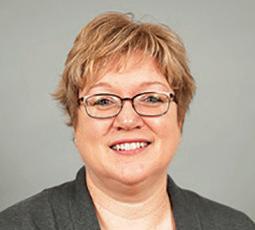
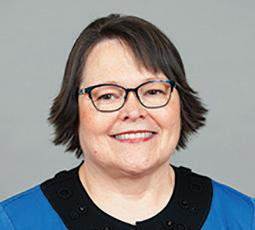










want to make you better when you are sick, keep you healthy when you are well, help you grow your family when a little one is on the way, and help you say goodbye in peace when your journey is done.






Jacob D. Parsons, DDS Steven G. Rabedeaux, DDS 1919 1st Avenue East • Newton, IA • 641-792-2780 www.thedentalpractice.net • Like us on Facebook



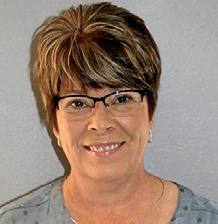








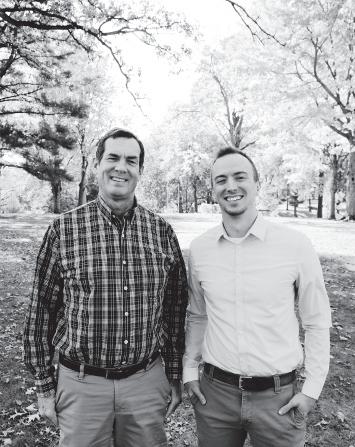




Various changes are associated with aging, and these can be physical, mental and emotional. Though each person manages these changes in their own way, there’s no denying that social interaction can benefit people from all walks of life as they navigate their golden years.
The Foundation for Senior Care says socializing can give seniors a sense of purpose, stimulate the mind, relieve boredom, potentially prevent feelings of depression, and give individuals something to look forward to. The senior living center Aston Gardens says socialization provides a significant boost to the cognitive health of older adults, helping to prevent or delay conditions that can affect memory.
Individuals looking to cultivate healthy social interactions may turn to clubs and other groups. If there’s a dearth of opportunities, individuals can start and promote their own social club using
this useful guideline.
Social clubs can meet and be organized around any number of themes or interests. Social clubs may meet to discuss gardening, crocheting, reading, or other shared hobbies. Friends also may be interested in doing food and beverage sampling. In such instances, a luncheon social club makes perfect sense.
Meeting details can be posted in a community bulletin or on a message board at a local house of worship. How-

ever, the internet can be a speedy messenger and help like-minded apeople figure out how to connect. Facebook groups are one way to organize social clubs, as is the website Meetup.com. The latter is a large online network of offline groups that meet all over the country and the world. The website makes it a snap to organize a local group or find an existing club.
Conduct a search of groups already meeting within a 50-mile radius to see if an existing group already meets your
criteria. If not, proceed full speed ahead as you establish your own club.
Most people prefer a schedule so they can plan their days accordingly. Choose a regular meeting time and place to hold the social club; otherwise, it can be confusing to accommodate everyone. Inconsistency also can make it hard to get the club off the ground.
For those new to hosting social clubs, it may be better to begin with only a few members as everyone gets into a groove. As the group becomes more established, it can be opened up to more members. Although it may be wise to cap membership so that things are more easily managed.
Social clubs are a great way for seniors to stay connected and active. When there isn’t one that meets a person’s interests, it’s relatively easy start one from scratch.

Ed Parker has joined Caldwell & Brierly PLLC in Newton.

Ed recently retired as General Counsel of the Iowa Farm Bureau Federation and its affiliated companies. Ed is a lifelong resident of Jasper County, having previously represented western Jasper County in the Iowa House of Representatives. Ed welcomes the opportunity to bring his experience in agricultural, commercial, and real estate law to the benefit of new clients.
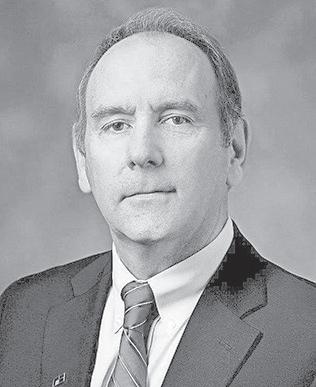

Caldwell & Brierly, PLLC www.lawyeriniowa.com 211 1st Ave. W., Newton, IA 50208 Call 641-792-4160 for an appointment.
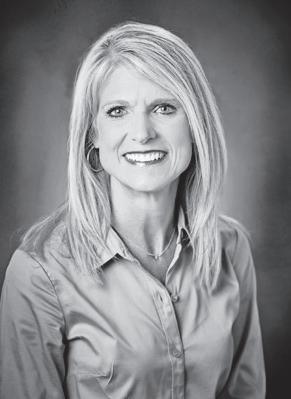


It’s not uncommon for aging individuals to feel less comfortable driving as they approach their golden years. Whether it’s glare from LED lights, aches and pains that often accompany aging or age-related vision issues, older drivers’ comfort behind the wheel can be compromised by a host of variables.
Though older drivers cannot reverse the aging process, they can try various strategies to make themselves more comfortable behind the wheel.
• Share driving duties on long trips. The National Institute on Aging notes that stiffening joints and weakened muscles are a common byproduct of aging. In addition, the Arthritis Foundation® notes that
more than one in two men and two in three women over age 65 have arthritis, which also can make driving less comfortable. Age-related aches and pains and arthritis can make it very uncomfortable to drive for lengthy periods of time when drivers are sitting in roughly the same position for the duration of their trip. In such instances, drivers can share driving duties to make long trips more manageable.
• Upgrade to a vehicle with modern amenities. Various amenities in modern vehicles make driving more comfortable for everyone, especially individuals with age-related aches and pains. Heated seats and in-car climate control can help reduce the discomfort caused by
aches and pains and ensure drivers and passengers can tailor the temperature in the vehicle to their own preferences.
• Protect your eyesight. Much of the discomfort older drivers experience behind the wheel has to do with eyesight. The NIA urges individuals 65 and older to see their eye doctor every year. Such visits can ensure prescriptions are current and that can make drivers more confident in their ability to see everything on the road. Drivers also can speak to their eye doctors about night driving glasses, which are designed to help nighttime drivers overcome glare from headlights and street lamps.
• Drive more defensively. A
greater emphasis on defensive driving also can help aging drivers feel more comfortable behind the wheel. The NIA notes that reflexes naturally slow down as a person ages, which adversely affects older drivers’ reaction times. Drivers can counter this by leaving more space between their vehicles and the one in front of them. Braking earlier and avoiding driving during times marked by heavy traffic, such as rush hour, also can help drivers feel more comfortable.
It’s natural for aging drivers to feel less comfortable behind the wheel than they did when they were young. But drivers can take various steps to increase their comfort levels so they can stay on the road.
The early years of midlife are a hectic time for many people. Around the time many people reach their late 30s and early 40s, they’re balancing the responsibilities of a career and a family. But as people enter their 50s, some of those responsibilities tend to be less significant, leaving more time for recreational pursuits.
Hobbies and other pursuits outside of work are often more fun when enjoyed with friends. People over 50 undoubtedly recognize that it’s not always so easy to make new friends, even though it’s undeniably beneficial to have supportive relationships into your golden years. A 2017 study from researchers at Michigan State University found that valuing friendships was a stronger predictor of health and happiness among older adults than valuing family. Those re-
sults align with an earlier Australian study that found Australians age 70 or older tended to live significantly longer if they had more strong friendships.
Making friends after 50 might not be as simple as it was during your school days, but these strategies can help men and women in midlife build new friendships.
• Identify your interests. Fiftysomethings who have spent the last couple of decades building a career and raising a family can give some serious thought to their interests outside of work or passions they hope to pursue now that they have more time to commit to such pursuits. The more interested you are in a given activity, the more likely you are to stick with it. And the longer you stick with something, the more
likely you are to meet like-minded individuals (i.e., future friends) willing to make similar commitments.
• Utilize social media. In years past, men and women over 50 may not have had any readily available tools to reach out and connect with new people. Social media has made it much easier to build such connections. Even the most obscure passions likely have a social media group of locals devoted to them, and these groups can be great ways to meet new people. A local runner’s club may have its own social media accounts, and local governments and community groups often share information about sports leagues and other groups via social media.
• Sign up for group outings. Communities often sponsor group outings to museums, the theater,
sporting events, and other day trips. Signing up for a bus trip to a local museum presents a great opportunity to meet people who share your interests, providing the potential to build lasting friendships built on a foundation of shared interests.
• Broaden your horizons. Just because you’re in your 50s doesn’t mean your friends have to be. Don’t hesitate to invite younger or older acquaintances and colleagues over for dinner or on weekend excursions. Friends come in all shapes, sizes and ages, so you could be missing out if you’re not willing to extend a hand in friendship to people of different ages and backgrounds.
Making friends after 50 can be challenging. However, various strategies can help men and women over 50 connect with new people.

Perhaps due to the popularity of social media among a generation of young people who grew up with it, platforms such as Instagram and Facebook are often associated with people born in the 21st century. However, a 2018 study from the Pew Institute found that 65 percent of adults between the ages of 50 and 64 used Facebook and 68 percent used YouTube.
Social media is often on the receiving end of negative attention, but it’s also a potentially valuable tool that can help men and women over 50 stay connected with their communities. That’s not always so easy for adults who no longer have children at home. And as its name suggests, social media can help users connect with others who share their interests. Such connections also can be hard to make for adults over 50.
Adults over 50 may be more comfortable with social media now than they were a decade ago, but it’s still a good idea to brush up on basic security measures that can help men and women protect their privacy as they utilize platforms like Facebook, Twitter and Instagram.
• Protect your personal information. No social media user has the right to access your personal information, including your address, date of birth or other data unique to you. Avoid interacting with anyone who requests personal information, employing the function to block such users from connecting with you when possible. It’s also important to keep information about travel plans private. For example, sharing details of an upcoming vacation can serve notice to potential criminals that no one will be in your house, making it a potential target for burglars.
• Aim for quality, not quantity, when building social media networks. Avoid accepting friend requests from individuals you don’t know. Cyber criminals often gain access to victims via social media, so limit your social media network to people you know and trust.
• Turn off location information. The technology behind social media is impressive and even makes it possible to determine where users are when they tweet or post to other platforms. But many users, especially those concerned about their privacy, don’t want to share location information with anyone, much less
strangers. Turn off location information and routinely double check to make sure it’s still turned off.
• Discuss others’ privacy concerns before posting to social media. Social media isn’t for everyone, and some people may not want photos of themselves or their children posted to plat-
forms like Facebook or Instagram. Prior to posting pictures or information about other people, confirm that they’re OK with you doing so.
Adults over 50 are engaging with social media. But no matter how comfortable users become, it’s still best to keep various social media safety protocols in mind.

Retirement provides individuals with ample time to engage in activities they enjoy. Many seniors spend that newfound free time relaxing and seeing the sights.

Seniors are a travel-friendly demographic. The World Tourism Organization says that, in 1999, more than 593 million international travelers were age 60 years and older. Seniors are projected to take two billion trips annually by 2050. As Baby Boomers and Generation Xers continue to retire, a larger portion of the overall population will have time to travel.
When seniors plan trips, they have many ways to get around in style.
Cruising can be an ideal way for older adults to travel. Cruise ships depart from ports across the world and travelers can choose from an array of itineraries. People can travel on cruises that are at sea for as few as three to five days to others that are out for weeks at a time.
One reason seniors enjoy cruising is because it’s all-inclusive with little extra planning required. Step aboard a cruise ship and enjoy a floating hotel complete with food, lodging, entertainment, shopping, gambling, and much more. Organized excursions at ports of call can add to the thrill of cruising.
Escorted tours are another option seniors may want to consider. By working with reputable tour operators, seniors can engage in affordable, safe and comfortable tours via bus, train or other modes of travel. Tour companies take the work out of the trips by handling the details and showcasing the best locales. Tour experts know when to schedule meals and sightseeing to avoid the crowds so that everyone can sit back and relax on their adventures.
Travel by recreational vehicle is a great
way for individuals with time on their hands to see the sights up close and personal. When RVing, the time spent traveling is the adventure, and the destination is simply the cherry on top.
The RV industry exploded during the pandemic because it provided a safe way to enjoy a vacation and get away from home. MARVAC Michigan RV & Campgrounds says currently more than nine million households own an RV in the United States. There’s no age limit to buying an RV, although the RV Industry Association says the average owner is 48-years-old and married.
RV-friendly campsites and parks enable travelers to mingle with each other, providing affordable and fun ways to travel.
Seniors who got in on the timeshare bandwagon early in life can choose to enjoy their travel years even further. The timeshare model enables buyers to purchase the right to use particular homes, condos, hotel rooms, resorts, or other accommodations for specific periods of time. For example, some timeshare agreements are for one week each year in a designated location. Seniors with more time on their hands may want to revisit timeshare agreements to increase the frequency in which they can use properties or to find timeshare companies that enable swapping properties with others so that different locales can be enjoyed.
Retirees may aspire to spend more time with family members who do not live nearby. Families may want to consider mother-daughter residences or properties with small guest houses so that seniors can stay in the residences when visiting but have some privacy at the same time.
Seniors have many travel options, and retirement is the ideal time to get out and enjoy time away from home.